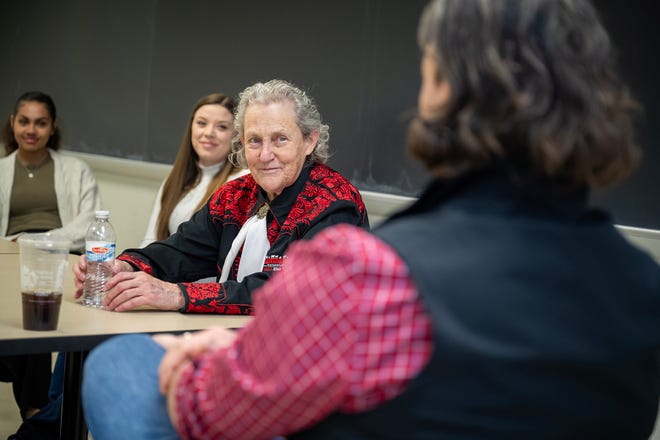Temple Grandin: Humane treatment of animals helps farmers’ meat processors’ bottom lines.

When University of Wisconsin-River Falls student Kelsey Kuehni had a question on April 10 about what is best practice when a mother pig scheduled for slaughter has babies, she had one of the world’s foremost experts at hand to give her the answer.
Temple Grandin, known worldwide for her work as a proponent of the humane treatment of livestock to be slaughtered and as a spokeswoman for autism, visited UW-River Falls last week. A professor of animal science at Colorado State University, Grandin spent time with two animal behavior classes, answering students’ questions and discussing her work in the animal welfare field. She also toured campus facilities, including the campus Meat Pilot Plant.
Betterment of animals vs. maximizing profit
During Grandin’s discussion with an advanced animal behavior class, Kuehni, a senior from Stanley majoring in animal science, asked Grandin questions and showed her photos of the mom pig and her babies birthed just before the mother was scheduled for slaughter. Grandin responded that the mother’s life should be spared so she can help raise her babies.
“We need to think more about the betterment of the animals and not always be maximizing profit,” Grandin said, noting that more humane treatment of animals actually helps farmers’ and meat processors’ bottom lines.
Students value Q and A with animal welfare expert
Students had the opportunity to interact with Grandin in small groups and in some cases have one-on-one discussions with her. The classes Grandin attended were question-and-answer sessions in which students queried her about everything from her career to the most humane livestock butchering practices.
Grandin, 76, didn’t grow up on a farm, she told students, and was introduced to cattle as a teenager. She began her work in agriculture writing stories for an ag magazine. At that time, the agriculture world was dominated by men, and writing about agriculture offered Grandin a way into the industry, she said.
“It wasn’t easy to be a woman and be in the agriculture industry in those days,” Grandin said. “If I hadn’t walked up to an editor and told him I wanted to write for him, and then produced one article and then another, I wouldn’t have done what I have since then. When you have an opportunity, you need to go for it. You never know what it will lead to.”
From writing about animals to working with them
Grandin eventually moved on from writing to working directly in the agriculture industry, developing new, more humane methods of dealing with animals. Among her many innovations that have become industry standards, Grandin developed a five-point scoring system to improve and track humane treatment of animals as part of the slaughtering process. Her ideas gained additional credibility, she said, when major food chains McDonald’s, Wendy’s and Burger King saw the benefits.
“I am most proud of my system for animal welfare, for helping ensure that animals are being treated more humanely,” she said. “It makes me feel like I have made a positive difference.”
Temple Grandin says autism has given her unique perspective
Having autism can present challenges, according to Grandin, but has also worked to her benefit. She views the world in a visual manner that better enables her to see from animals’ perspectives and how to address their fears or concerns.
“In a way (autism) works for me. It helps me see details that others don’t,” Grandin said.
The chance to learn from a world-renowned personality wasn’t lost on Kuehni and other students.
“It was a really cool experience,” Kuehni said of her discussion with Grandin. “I’ve looked up to her for a while and read some of her books. It was great to get her thoughts on the (meat processing) industry and to learn about her career.”
Seven Ferguson, a graduate of Ohio State University working as a research assistant in dairy welfare at UW-River Falls, said she was impressed with Grandin’s high energy level, deep knowledge and frank manner.
“She is very outspoken and is quick on her feet when answering questions,” said Ferguson, of Toledo, Ohio, who will begin her graduate studies at UW-River Falls in the fall. “She has so many interesting stories to tell, and so much knowledge to share with us.”
UW-RF professor credits Grandin for his professional success
UWRF Animal Science Professor Kurt Vogel first met Grandin while working in a large, now defunct meat processing plant in Milwaukee. Grandin eventually convinced Vogel to study under her at Colorado State University. The two remain close friends, and Vogel credits Grandin with his professional success which includes his starting the Humane Handling Institute at UW-River Falls, the first-of-its-kind training program for meat processors.
Vogel said he was thankful and honored as he watched Grandin interact with students.
“A lot of what I teach came from her, so she has already had her impact on my students,” Vogel said. “I am so happy to facilitate her connection to them.”